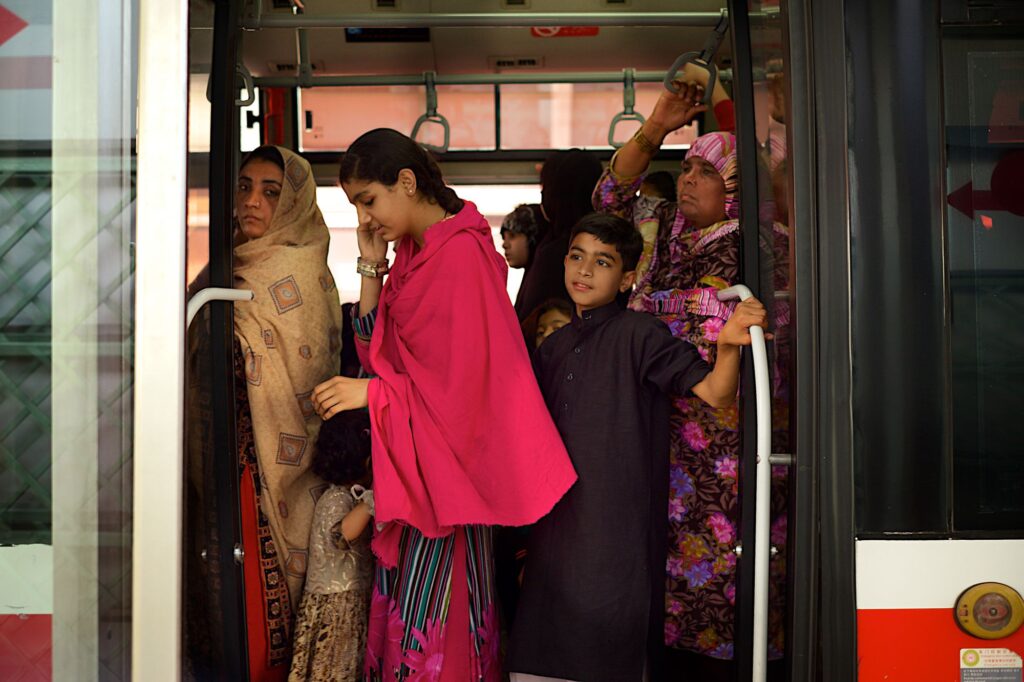Pakistan (Commonwealth Union)_ An innovative bus scheme for women known as the bus rapid transit (BRT) system was launched in Peshawar. The new system provides female students and working women with secure travel, which is something that women passengers cannot expect on ordinary public transportation.
Khyber Pakhtunkhwa, one of the four provinces in Pakistan, is regarded as a conservative region where the majority of women conceal their faces while coming out in public and avoid traveling alongside men on buses. Hence, the new service has been a boon for the female population of Peshawar metropolis.
According to Javeria Khan, a 21-year-old student at the University of Peshawar, “Prior to the launch of the Bus Rapid Transit (BRT) system, girls faced enormous hardships in reaching colleges and universities, but now, we don’t have any issue in getting to our respective institutions in a timely manner”. She also informed that two of her older sisters had abandoned their studies after completing secondary school due to inadequate transportation services. She added, “Now, there is a sea-change as far as transportation is concerned; thanks to BRT, we reach home on time without any hindrance”.
The scheme was introduced in April 2020, and the BRT consists of a fleet of 150 Chinese-imported air-conditioned buses that charge USD 0.24 from the first to the last stop and USD 0.09 for one stop. It features a 27-kilometer-long corridor with several stops to accommodate around 400,000 users each day, 20 percent of whom are women. According to Spogmay Khan, a 17-year-old second-year student at the Jinnah College for Women, everyone in her class praised former Prime Minister Imran Khan, who initiated the program in the city. She stated that the majority of college students who were formerly dropped off by their parents or siblings now go alone since the buses are secure.

According to Umair Khan, a representative for BRT, “We have allocated 25 seats to women in each bus, so they don’t face any harassment. The buses go along the main road, which provides a service to the general public as well as the students”. He added that prior to the launch of BRT, accusations of harassment and exorbitant costs on private buses discouraged women from commuting. But now, ladies have separate cabins equipped with security measures to confirm the safety of all passengers.
The BRT was awarded the Gold Standard Award in February 2022 for revolutionizing transportation with its clean technology buses and fostering non-motorized traffic. A month earlier, it was awarded the International Sustainable Award by the International Transport Organization, and UN Women has also recognized the BRT for providing women with safe commuting options. In addition, Transport Ticketing Global, UK, also honored BRT with an award for improving the lives of a huge segment of society via the use of creative solutions.
BRT also benefits the general populace. According to Palwasha Bibi, a 30-year-old local resident, the BRT was built to support female employees. She stated that it was extremely difficult to obtain a seat on a private bus prior to the BRT. Another resident, Muhammad Zaheer, a 31-year-old salesperson at a grocery store, stated that he had been driving a motorcycle to get to work, which was more expensive and time-consuming. Naureena Shah, a student at Islamia College Peshawar, stated that the BRT was a boon for her. A schoolteacher, Nasreen Hamid, also lauded the services of BRT.
According to Khan, former Pakistani prime minister Imran Khan gets credit for enhancing the education of women. He stated, “Many of our classmates wouldn’t have been able to take admission because of the messy traffic and worn-out buses, but the BRT has solved this issue, once and for all”. Umair Khan, a representative of BRT, stated that feeder routes had been established so that commuters may use the facility near their residences. The feeder buses utilize the roadways, and people board these buses after alighting from BRT corridor buses. He added that approximately 20% of the BRT’s 4,000 staff are women.








